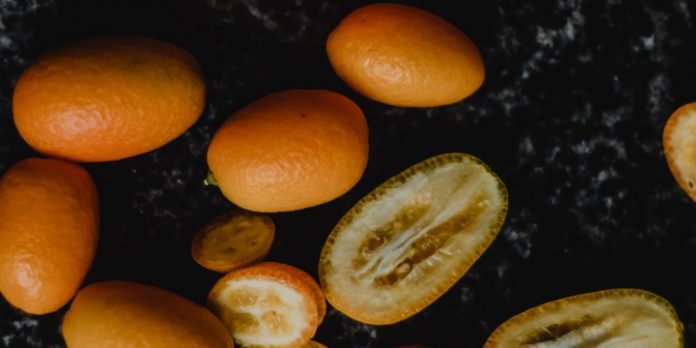What Is Kumquat?
Citrus fruits such as oranges and lemons are popular all over the world and have established a position in the fruit world. The kumquat, on the other hand, is a relatively unknown fruit from the same family.
A kumquat is a Southeast Asian orange-like fruit. Though the citrus fruit looks and tastes like an orange, it is actually relatively small, about the size of an olive. Kumquats are typically spherical or oblong in shape.
The English term “kumquat” is derived from the Cantonese phrase for “golden orange” or “golden tangerine.” We don’t know how long the fruit has been farmed, but the first recorded mention was in 12th-century China.
Though it has been a staple in Southeast Asian nations such as China, Japan, India, and Taiwan for generations, the kumquat was not introduced to Europe until the mid-1800s. It was grown in North America by 1850.
While the kumquat tree can withstand freezing conditions, it produces larger and tastier fruits in warmer climes. The kumquat has a unique citrus taste. The fruit is slightly sweet, but the flavor is mostly sour and acidic. The kumquat peel is the most delectable part of the fruit.
Varieties of Kumquat
There are several kumquat types, but the most popular are Nagami and Meiwa:
Nagami Kumquat
Meiwa Kumquats
Nutritional Value of Kumquat
Despite its diminutive size, the kumquat delivers a powerful nutritional punch. Kumquats, which are high in both vitamin C and fiber, outperform other, more well-known fresh fruits.
Here are some of the nutritive values of kumquat:
- Vitamin C-rich (73% of the RDI in one 100-gram serving)
- Fiber-dense (6.5 grams per serving)
- Antioxidant-dense
- Relatively low in calories (71 per serving)
- Hydrating (water accounts for 80% of the fruit’s weight)
- Carbohydrates: 15.9 g (9.4 g sugars and 6.5 g fiber)
- 1.88 g protein
- 0.86 g fat
- 290 IU provitamin A (10% of recommended vitamin A daily intake)
- 62 mg calcium (6% of recommended daily intake)
- 20 mg magnesium (7% of recommended daily intake)
10 Health Benefits of Kumquat
Promotes Weight Loss
 Kumquat’s high fiber content makes it ideal for those looking to lose weight. The high fiber content causes your stomach walls to stretch. The stretching of the stomach walls, in turn, has a negative impact on the synthesis of leptin and ghrelin, your body’s hunger hormones.
Kumquat’s high fiber content makes it ideal for those looking to lose weight. The high fiber content causes your stomach walls to stretch. The stretching of the stomach walls, in turn, has a negative impact on the synthesis of leptin and ghrelin, your body’s hunger hormones.
With a lower concentration of these hormones in your blood, your appetite can be suppressed, allowing you to consume less calories throughout the day. Furthermore, kumquat stimulates the enzyme PPRA, which has been demonstrated to boost fat burning.
Enhances Bone Density
Your skeletal system, which is made up of bones, is your complete structure. Your bones are formed of living cells that multiply and divide, and require a lot of calcium which is generally known, but what isn’t as commonly known is that kumquats are a fantastic source of calcium that may help strengthen and enhance the density of your bones. It will keep your bones from becoming brittle and may help avoid fractures.
Increases Metabolism
The pace at which your body uses energy is referred to as metabolism. Every individual has a basal metabolic rate (BMR), which is the rate at which your body utilizes energy while at rest. The digestion of macromolecules in your digestive system accounts for the majority of the energy consumed on metabolism.
A high concentration of B-complex vitamins can help your body’s natural system for digesting these complex chemicals, allowing you to get the most out of what you consume.
Aids the Digestive System
Your GI tract is a marvel, as it enables the digestion of complex macromolecules such as carbs, proteins, and lipids. It does, however, have some prerequisites. Your digestive tract cannot break down cellulose fibers; nonetheless, it requires them to function properly.
These fibers are essential to the process of peristalsis, which is the mechanism through which food passes through the digestive system.
Kumquats are high in fibre that aid digestion. Not only that, but it can efficiently clean out your colon and small intestine by doing so. It also aids in the prevention of bloating, constipation, and colitis.
Helps with Blood Sugar Control
Citrus fruits are frequently suggested to persons with diabetes and obesity. Kumquat is no exception. The high fiber content can help keep cravings at bay and minimize the quantity of calories consumed.
It has a good impact since it can help balance your insulin levels and prevent you from harmful blood sugar spikes and drops.
People who are at risk of developing type 2 diabetes should also take this fruit since it can help manage insulin levels and battle insulin resistance in somatic cells.
Supports Hair Growth
This unusual fruit, which has a sufficient amount of vitamin C, may have a terrific effect on your hair. It increases the general structure of the hair follicle and enables for the improvement of your scalp. It also minimizes the likelihood of hair fall and enhances the overall appearance of your hair. Kumquat intake also has the added benefit of being an effective dandruff deterrent, since it decreases sebum production and inhibits the growth of fungus on the scalp, which is the major cause of dandruff.
Defends Against Scurvy
The disorder induced by a shortage of vitamin C in the diet is known as scurvy. It may be extremely damaging to your skin, hair, and nails. It’s because all of these tissues require a steady supply of collagen to rebuild properly, which necessitates, you guessed it, vitamin C.
If you don’t want your toes to fall off in the near future. I strongly advise you to purchase a couple kumquats. Kumquats have the added benefit of being edible in their peel, which provides more vitamin C.
Great for your Vision
 Compounds such as beta-carotene and vitamin A, which are also present in carrots, are connected to visual health.
Compounds such as beta-carotene and vitamin A, which are also present in carrots, are connected to visual health.
Beta-carotene is an antioxidant that fights oxidative stress in retinal cells and efficiently combats macular degeneration. All of these can lead to a lower chance of having cataracts.
Boost your Energy
You wouldn’t think kumquats would be high in carbs, yet they are! Carbohydrates are vital for quickly refilling our energy stores. These fruits may provide us a boost of energy while also providing us with a slew of additional advantages! The high quantity of riboflavin, a vital vitamin involved in energy synthesis, facilitates this process even more.
Anti-Inflammatory Effect
When a hazardous pathogen is present in the body, the immune system responds by destroying the infection. Inflammation is the name given to this reaction. It is most common in arthritis, inflammatory bowel disease, asthma, diabetes, autoimmune illnesses, cardiac difficulties, and neurological diseases. If the inflammation increases, cell death and organ damage may occur.
Kumquats contain a variety of flavonoids, including kaempferol, luteolin, hesperidin, quercetin, C-glycoside, and others. C-glycoside has been shown in a few trials to have anti-inflammatory effects. It accomplishes this by lowering the immune system’s inflammatory response and the creation of damaging free radicals.
Now that you Know…
Kumquats are one-of-a-kind, sweet, and nutritious fruits with numerous health benefits. They are a flexible element in a variety of cuisines, whether sweet, sour, or acidic, however, it is important to obtain them from sanitary sources because they may have been exposed to a variety of toxins before reaching our bodies.




